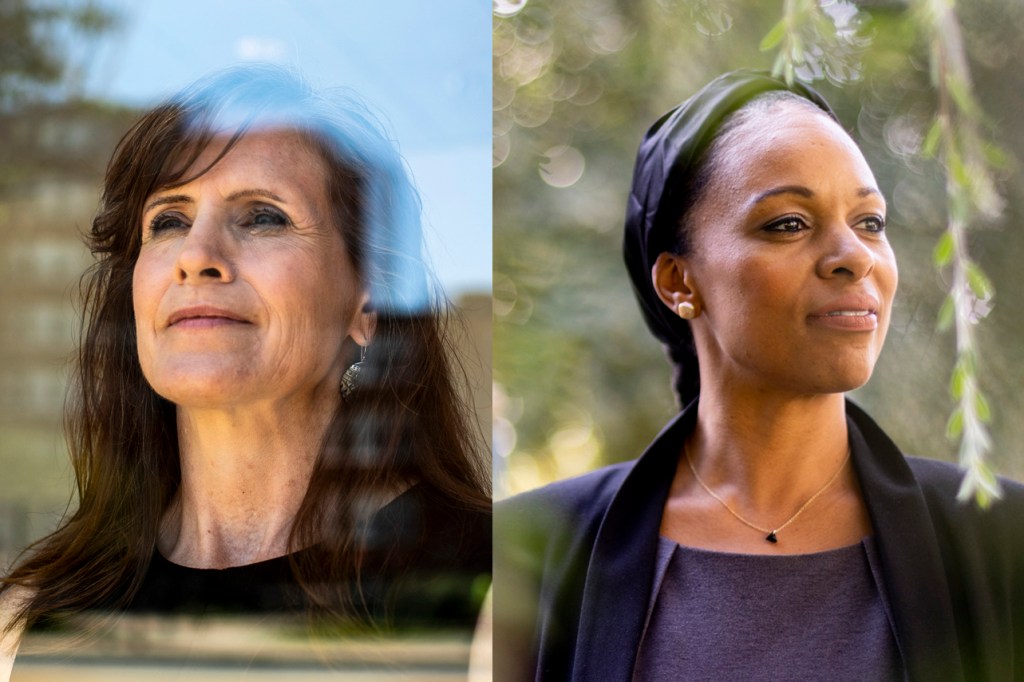Professors in Boston and Oakland honored for creating ‘a model of how Northeastern’s global network can be leveraged to create real and measurable change’

One year after their initial meeting, two Northeastern professors from opposite coasts have been honored for leveraging the university’s global network to solve problems in local communities.
Alicia Sasser Modestino (based on the Boston campus) and Carrie Maultsby-Lute (Oakland) are joint recipients of Northeastern’s inaugural Network Accelerator Award. Together they’ve launched a Northeastern-sponsored organization, Community to Community, which uses research to confront difficult problems and develop long-term solutions based on the needs of the community. Community to Community is one of many impact accelerators and engines deployed by Northeastern to solve problems by clustering together expertise from a variety of disciplines and experiences.
“The larger goal of Community to Community is to bridge the gap between knowledge and practice,” says Modestino, an associate professor of public policy and urban affairs and economics, as well as research director for the Dukakis Center for Urban and Regional Policy. “It’s about producing research in partnership with state agencies, departments and community-based organizations to move the needle on long-standing problems in areas such as housing, workforce development, opioids or crime.”
Community to Community recently announced its inaugural policy fellows and seed grant recipients made up of Northeastern faculty and students (post-doctoral and Ph.D.) who are seeking to reduce racial and economic disparities across a wide variety of areas including racial reparations, criminal justice, climate justice, gentrification, immigrant legal services, healthcare and workforce development.
“These scholars are diverse not only in their lived experiences but also their fields of study, the methods they employ and their college appointments,” Modestino says. “One thing that they all have in common is their commitment to add value to the communities that we live and work in.”
Public and private leaders work with researchers to develop meaningful policies while working directly with people in the community, says Maultsby-Lute, who has served as director of the Center for Transformative Action and a marketing professor of practice at Mills College at Northeastern.
“It centers the people who are actually living that experience and making sure that they’re empowered to solve problems in their own communities,” says Maultsby-Lute, who recently was appointed to head of partnerships for the Oakland campus, including Mills College at Northeastern. “Really it’s about bringing the best people together to solve a problem.”
Based on Modestino’s decade-long research partnership studying Boston’s summer youth employment program, Northeastern is creating 125 employment opportunities on the Boston campus for young people this summer via the city’s SuccessLink summer jobs program. Another 10 jobs will be available at Northeastern’s Oakland campus.
Altogether, it is the first step of an ambitious initiative that may lead to similar community-based efforts throughout the university’s global network of 11 cities.
“Mills College has never worked with the city of Oakland in this fashion, so it’s new for us,” Maultsby-Lute says. She envisions the Oakland program growing in partnership with local organizations that support more than 800 students who are seeking summer employment. Maultsby-Lute would like to see the Oakland program operate beyond the summer and provide six months of education, training and financial assistance for young people—modeled after Northeastern’s co-op program.
David Madigan, provost and senior vice president for academic affairs at Northeastern, is leading a consortium of colleges in the Greater Boston area that are following Northeastern in offering summer jobs on campus.
The two professors first met via Zoom one year ago to discuss a potential collaboration. That initial conversation expanded to almost two hours as they realized the interdisciplinary match between Modestino’s background in economics as a former senior economist at the Federal Reserve Bank of Boston and Maultsby-Lute’s in marketing with more than a decade of experience with a Fortune 500 company and other firms.
“Our impact accelerator is designed in a very systematic way to not just incentivize and fund research across the global university system, but also to create a community of practice across Northeastern’s researchers while sharing knowledge from one campus location to another—all centered around doing community-engaged research,” Modestino says.
Modestino says the program’s “engage, think and do” model of co-creating, investigating and implementing solutions can be applied to all kinds of community-based projects.
“First we engage by developing a trusting relationship with our policy partner that often involves doing some work up-front to show your value,” Modestino says. “So you develop the data and show them what they can do with that research evidence. That ‘thinking’ phase is everything from what are the questions that you’re going to answer to the data you’re going to collect to how you interpret those findings.
“And then there’s the ‘doing’ portion,” Modestino says. “We don’t just offer a recommendation and walk away. We stick around, we help them implement that solution and evaluate it—and then we go around this cycle again in terms of engaging and thinking and doing, because that’s how you make progress on these intractable social problems.”
Modestino and Maultsby-Lute were honored with the Network Accelerator Award for “connecting diverse communities of problem-solvers” that “span disciplines, colleges, campuses, countries and industry sectors.”
“Through their impact engine, Alicia and Carrie have leveraged Northeastern University’s diverse community of experts,” said Gbemi Disu, Northeastern’s vice president for global network expansion, while presenting their award at the Academic Honors Convocation last week. “Not only have they initiated a positive shift in public policy that is actively improving the lives of individuals in urban communities around the United States, but their efforts also serve as a model of how Northeastern’s global network can be leveraged to create real and measurable change.”
Ian Thomsen is a Northeastern Global News reporter. Email him at i.thomsen@northeastern.edu. Follow him on Twitter @IanatNU.






